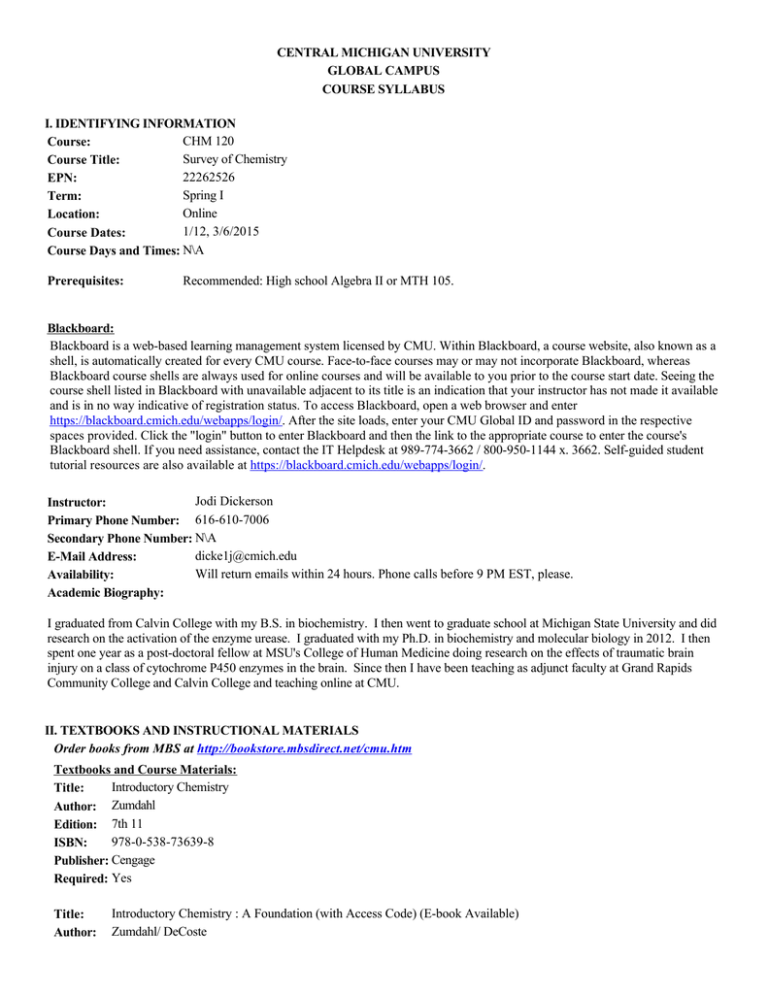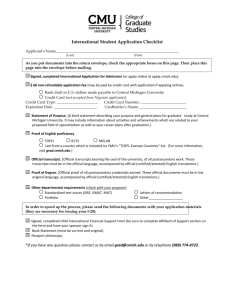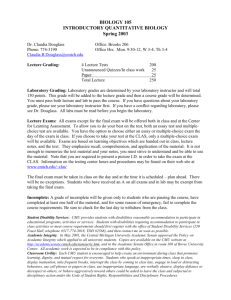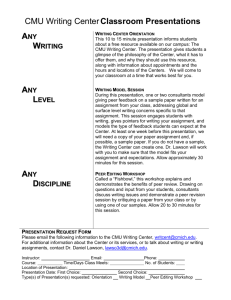
CENTRAL MICHIGAN UNIVERSITY
GLOBAL CAMPUS
COURSE SYLLABUS
I. IDENTIFYING INFORMATION
CHM 120
Course:
Survey of Chemistry
Course Title:
22262526
EPN:
Spring I
Term:
Online
Location:
1/12, 3/6/2015
Course Dates:
Course Days and Times: N\A
Prerequisites:
Recommended: High school Algebra II or MTH 105.
Blackboard:
Blackboard is a web-based learning management system licensed by CMU. Within Blackboard, a course website, also known as a
shell, is automatically created for every CMU course. Face-to-face courses may or may not incorporate Blackboard, whereas
Blackboard course shells are always used for online courses and will be available to you prior to the course start date. Seeing the
course shell listed in Blackboard with unavailable adjacent to its title is an indication that your instructor has not made it available
and is in no way indicative of registration status. To access Blackboard, open a web browser and enter
https://blackboard.cmich.edu/webapps/login/. After the site loads, enter your CMU Global ID and password in the respective
spaces provided. Click the "login" button to enter Blackboard and then the link to the appropriate course to enter the course's
Blackboard shell. If you need assistance, contact the IT Helpdesk at 989-774-3662 / 800-950-1144 x. 3662. Self-guided student
tutorial resources are also available at https://blackboard.cmich.edu/webapps/login/.
Jodi Dickerson
Instructor:
Primary Phone Number: 616-610-7006
Secondary Phone Number: N\A
dicke1j@cmich.edu
E-Mail Address:
Will return emails within 24 hours. Phone calls before 9 PM EST, please.
Availability:
Academic Biography:
I graduated from Calvin College with my B.S. in biochemistry. I then went to graduate school at Michigan State University and did
research on the activation of the enzyme urease. I graduated with my Ph.D. in biochemistry and molecular biology in 2012. I then
spent one year as a post-doctoral fellow at MSU's College of Human Medicine doing research on the effects of traumatic brain
injury on a class of cytochrome P450 enzymes in the brain. Since then I have been teaching as adjunct faculty at Grand Rapids
Community College and Calvin College and teaching online at CMU.
II. TEXTBOOKS AND INSTRUCTIONAL MATERIALS
Order books from MBS at http://bookstore.mbsdirect.net/cmu.htm
Textbooks and Course Materials:
Introductory Chemistry
Title:
Author: Zumdahl
Edition: 7th 11
978-0-538-73639-8
ISBN:
Publisher: Cengage
Required: Yes
Title:
Author:
Introductory Chemistry : A Foundation (with Access Code) (E-book Available)
Zumdahl/ DeCoste
Edition: 7th
978-0-538-75708-9
ISBN:
Publisher: Brooks Cole
Required: Yes
Introductory Chemistry: Study Guide
Title:
Author: Zumdahl
Edition: 7th
978-0-538-73640-4
ISBN:
Publisher: Houghton Mifflin
Required: No
Course Reserves:
N\A
Required Materials:
N\A
Recommended Materials:
N\A
III. COURSE DESCRIPTION
Elementary concepts in chemistry. For students on curricula needing minimal chemical background or students who need
additional preparation for CHM 131. Satisfies University Program Group II laboratory requirement. Cannot be counted on a
Chemistry/Biochemistry major or Chemistry minor. (University Program II-B).
IV. COURSE GOALS AND OBJECTIVES
After successful completion of this course, the student will be able to:
1. Employ basic mathematics skills to solve chemical problems in each of the areas covered.
2. Use the Scientific Method to trace the development of ideas from hypothesis through theory to scientific law.
3. Identify evidence for a chemical reaction, balance chemical equations and derive quantitative (stoichiometric) relationships
between species.
4. Write proper Lewis dot diagrams for simple covalent molecules and predict their geometries as well as polarities.
5. Use the gas laws to calculate and/or predict the behavior of ideal gases.
6. Explain the essential features of the kinetic-molecular theory and describe the different properties of gases, liquids and solids at
the molecular level.
7. Analyze the properties of solutions (vapor pressure lowering, boiling point elevation, freezing point depression, and osmotic
pressure) qualitatively and quantitatively (concentration, molarity, molality, % mass).
8. Derive mathematical expressions for the equilibrium constant for any chemical reaction; use experimental data to calculate
yields; and predict the effects of temperature, pressure, and concentration on the position of equilibrium and the value of the
equilibrium constant (LeChatelier’s Principle).
9. Describe the structure of the atom and specify the ground state electron configuration for a given atom; use the laws of
periodicity to predict the chemical reactivity of the elements based on their position in the Periodic Table.
10. Identify three states of matter and calculate energies associated with changing temperature and phases.
11. Use chemical symbols to write simple formula when given the compound name and to correctly write the name of a simple
compound when given the formula (nomenclature).
12. Explain basic atomic theory;
13. Use Avogadro’s number in calculations. 14. Interconvert between the Fahrenheit, Celsius and Kelvin temperature scales.
15. Describe the relationship between electrical and chemical energy;
16. Identify oxidation-reduction reactions and the oxidation state of all species in the equation.
17. Solve simple acid-base chemical problems involving pH, pOH, [H+] and [OH-].
18. Write a balanced radioactive decay equation.
19. Describe the concepts of nuclear fission, nuclear fusion, and half-life.
20. Use the method of double displacement to predict the products of precipitation reactions.
V. METHODOLOGY
Grading Scale: 85-100% = A; 75-84% = B; 60-74% = C; 50-59% = D. Plus and minus grades
will be assigned for averages near the borderline. Any student guilty of academic dishonesty
will receive a failing grade for the course.
Total Points Available:
Graded Items Total
OWL Assignments (1 point each, 20 total assignments) = 20
Quizzes (5 points each, 4 total quizzes) 20
Exams (40 points each, 4 total exams) 160
Overall total for course = 200
Assignments: There will be twenty OWL assignments for the course. Each assignment will be
worth 1 point (20 points total for the course). An entire assignment must be completed to earn
the point for that assignment. The problems in each assignment are chosen to help students
perform well on the quizzes and exams. The assignments should be completed before taking the
quizzes or exams.
Quizzes: Each student will also take four online quizzes. These quizzes will each be worth 5
points (20 points total). The quizzes are online and unlike the exams, they do not need to be
taken with a proctor and they are open book. Quiz 1 must be taken in the first 2 weeks. Quiz 2
must be taken by the end of the fourth week. Quiz 3 must be taken by the end of the sixth week.
Quiz 4 must be taken by the end of the eighth week.
Exams: During a typical eight-week course students must complete four exams that will be
given at proctored sites designated by the student and approved by CMU. Please go to the following link to find out how to
designate a proctored site
(http://ddlcampus.cmich.edu/orientation/cgi-bin/proctors1.asp). You will work out times with
your proctor to take the exams. Exams 1 and 2 must be taken by the end of the fifth week and
exams 3 and 4 must be taken by the end of the course (see more information on the exams and
specific due dates in the exams section of the blackboard site for the course). Each exam will
contain twenty multiple-choice questions. Each exam will be worth 40 points (160 points total
for course). The exams are all comprehensive but weighted toward the material most recently
covered in the class. There will be no retake exams.
Keys to doing well in the course: To help each student perform at an acceptable level in the
course, the instructor will 1) suggest certain reading from the textbook (see suggested reading
schedule below), 2) provide an outline of lecture notes that students may fill in as they read the
textbook, 3) provide review sheets (and video reviews) for each exam, and 4) provide video
demonstrations. Items 2-4 are all available at the course blackboard site.
Do not get behind. Work on the OWL assignments as you read each chapter. Even though
exams 1 and 2 are not due until the end of the 5th
week, it is recommended to take exam 1 soon
after quiz 1 and exam 2 soon after quiz 2.
VI. COURSE OUTLINE/ASSIGNMENTS
Pre-Class Assignment:
1. Read the syllabus
2. View Class Introduction video
3. Browse Blackboard, familiarize yourself with where things are.
Course Outline:
1.Chemistry: An Introduction
2. Measurements and Calculations
3. Matter and Energy
4. Chemical Foundations: Elements and Atoms
5. Elements, Ions, and Nomenclature
6. Chemical Reactions: An Introduction
7. Reactions in Aqueous Solution
8. Classifying Chemical Reactions
9. Chemical Composition
10. Chemical Quantities
11. Modern Atomic Theory
12. Chemical Bonding
13. Gases
14. Liquids and Solids
15. Solutions
16. Equilibrium
17. Acids and Bases
18. Oxidation-Reduction Reactions and Electrochemistry
19. Radioactivity and Nuclear Energy
Assignment Due Dates:
Week # Monday
Tuesday
Wednesday
Thursday
Friday
1
Chapter 1
2.1-2.3
2.4-2.7
2.8-3.2
3.3-4.2
2
4.1-4.6
4.7-4.11
5.1-5.4
5.5-5.7
3
6
7.1-7.3
7.4-7.7
8.1-8.4
4
8.7-8.9
9.1-9.2
9.3
9.4-9.6
5
10.1-10.6
10.7-10.10
11.1-11.6
11.7-11.11
6
12.6-12.10
13.1-13.7
13.8-13.10
14
7
15.1-15.4
15.5-15.8
16.1-16.3
16.4-16.6
18.5-18.8
19
OWL 17
OWL 18
OWL 19
8
17.6-17.9
18.1-18.4
OWL 3
OWL 4
OWL 5
8.5-8.6
OWL 6
OWL 7
OWL 8
OWL 9
12.1-12.5
OWL 10
OWL 11
OWL 12
OWL 13
OWL 14
17.1-17.5
OWL 15
OWL 16
Saturday
OWL intro
OWL 1
OWL 2
Quiz 1
Quiz 2
EXAM 1
EXAM 2
Quiz 3
Quiz 4
Exam 3
Exam 4
Post-Class Assignment:
None
Student Involvement Hours:
This is a 4 credit class over an 8 week period.
VII. CRITERIA FOR EVALUATION
Evaluation Criteria:
Your grade will be based on how well you do on the homework and exams.
Grading Scale:
Letter
Letter
Percentage
Grade
Percentage
Grade
Above 93%
A
73-76.9%
C
90-92.9%
A-
70-72.9%
C-
87-89.9%
B+
67-69.9%
D+
83-86.9%
B
63-66.9%
D
80-82.9%
B-
60-62.9%
D-
77-79.9%
C+
Below 60
E
Late Assignments:
No late assignments will be accepted.
Make-ups and Rewrites:
No make ups or rewrites will be allowed, except in emergency situations.
VIII. EXPECTATIONS
Attendance and Participation:
Netiquette: Emails are the primary communication channel in this online course. Pay attention
to the following when you are communicating with your instructor and/or peer students in online
courses:
1. Use a descriptive subject line. When creating a new message or replying a message, use a
descriptive subject line that reflects the content of your message.
2. Write in short paragraphs. If you have lots to say, break it down using smaller segments.
Make things easier for the readers.
3. Do not write in all upper case. ALL CAPS MEANS YOU ARE SHOUTING although
you may not mean it.
4. Use emotional symbols (such as ?) to indicate the tone of voice. It is often hard to tell
the emotion of a text-based message.
5. Respect others. Like all communication and discussion occupations, use your
professionalism and talk to others with respect.
6. People in this course may come from places around the world, so be respectful to other
cultures and languages. Be careful with sarcasm.
Academic Integrity:
Because academic integrity is a cornerstone of the University's commitment to the principles of free inquiry, students are
responsible for learning and upholding professional standards of research, writing, assessment, and ethics in their areas of study.
Written or other work which students submit must be the product of their own efforts and must be consistent with appropriate
standards of professional ethics. Academic dishonesty, which includes cheating, plagiarism and other forms of dishonest or
unethical behavior, is prohibited. A breakdown of behaviors that constitute academic dishonesty is presented in the CMU Bulletin
(https://bulletins.cmich.edu/).
Student Rights and Responsibilities:
Each member of the Central Michigan University community assumes an obligation regarding self conduct to act in a manner
consistent with a respect for the rights of others and with the University's function as an educational institution. As guides for
individual and group actions within this community, the University affirms the general principles of conduct described in the Code
of Student Rights, Responsibilities and Disciplinary Procedures at https://www.cmich.edu/ess/studentaffairs/Pages/Code-ofStudent-Rights.aspx.
IX. SUPPORT SERVICES AND OTHER REQUIREMENTS
Global Campus Library Services (GCLS)
CMU offers you a full suite of library services through its Global Campus Library Services (GCLS) department. Reference
librarians will assist you in using research tools and locating information related to your research topic. The library's Documents
on Demand office will help you obtain copies of the books and journal articles you need. Check out the GCLS website at
http://gcls.cmich.edu for more information.
Reference librarian contact information:
1. By phone: (800) 544-1452.
2. By email: oclsref@cmich.edu
3. By online form: http://www.cmich.edu/library/gcls/Pages/Ask-a-Librarian-Request-Form.aspx
Documents on Demand office contact information:
1. By phone: (800) 274-3838
2. By email: docreq@cmich.edu
3. By fax: (877) 329-6257
4. By online form: http://www.cmich.edu/library/gcls/Pages/Documents-on-Demand.aspx
Writing Center
The CMU Writing Center is a free online service for all CMU students, providing help with grammar, citations, bibliographies,
drafts, and editing of academic papers. Suggestions and feedback are typically provided within two business days. For additional
information and to submit work, visit http://webs.cmich.edu/writingcenter/
Mathematics Assistance Center
The CMU Mathematics Assistance Center provides free tutoring in mathematics and statistics to students enrolled in select courses.
Tutoring is available online and via telephone. To see what courses qualify and to register with the Math Assistance Center, visit
http://global.cmich.edu/mathcenter/tutoring-request.aspx.
ADA
CMU provides individuals with disabilities reasonable accommodations to participate in educational programs, activities and
services. Students with disabilities requiring accommodations to participate in class activities or meet course requirements should
contact Susie Rood, Director of Student Disability Services at (800) 950-1144, extension 3018 or email her at sds@cmich.edu, at
least 4 weeks prior to registering for class. Students may find additional ADA information and forms at
https://www.cmich.edu/ess/studentaffairs/SDS/Pages/default.aspx
Note to faculty: CMU Administration will notify you if applicable; otherwise, the student will provide a "Notification Letter to the
Instructor" outlining the accommodations the student is approved to receive.
X. BIBLIOGRAPHY
1. American Chemical Society Chemistry in the Community ChemCom, 5th Edition New York: W. H. Freeman, 2006. (ISBN: 0716-78919-1 or ISBN-13: 978-0-716-78919-2).
2. Corwin, Charles H. Introductory Chemistry Concepts & Connections, 5thEdition. Upper Saddle River, NJ: Pearson Prentice
Hall, 2008. (ISBN-10: 0132321483 or ISBN-13:9780132321488).
3. Hein, Morris; Arena Susan Foundations of College Chemistry, 13th Edition New York: J.W. Wiley, 2011. (ISBN: 978-0-47046061-0).
4. Stoker, Stephen H. Introduction to Chemical Principles, 10th Edition. Upper Saddle River, NJ: Prentice Hall, 2011. (ISBN-10:
0321666046 or ISBN-13: 9780321666048).
5. Tro, Nivaldo J. Introductory Chemistry, 4th Edition. Upper Saddle River, NJ: Prentice Hall, 2012. (ISBN-10: 0321741021 or
ISBN-13: 9780321741028).6. Zumdahl, DeCoste Introductory Chemistry A Foundation, 7th Edition. Belmont, CA:
Brookes/Cole, 2011 (ISBN-10: 1439049408 or ISBN-13: 9781439049402
Center Information
Central Michigan University’s Global Campus
CMU Online
(800) 688-4268 or (989) 774-1129
Fax (989) 774-1998
Email cmuonline@cmich.edu
Website www.global.cmich.edu/CMUOnline
Online Resources
CMU Computer Help Desk https://www.cmich.edu/office_provost/OIT/help/help_desk/Pages/default.aspx
Pre-Class Checklist http://www.global.cmich.edu/cmuonline/checklist.aspx
Online Learning Resource Center http://www.global.cmich.edu/cmuonline/about/
Drop/Withdrawal Policy: http://global.cmich.edu/courses/drop-withdraw.aspx
Page 8 of 8





